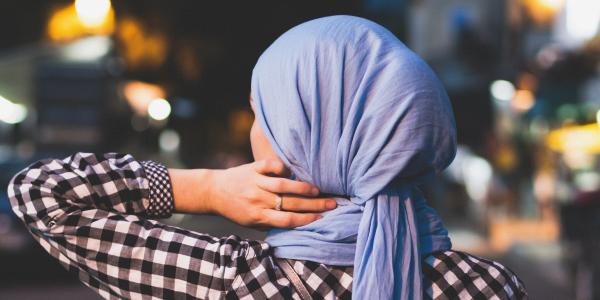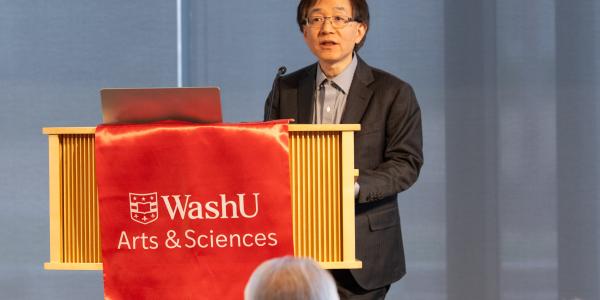This episode was released just days before tragic terrorist attacks occurred in Paris in November 2015. For commentary from John Bowen following the attacks, please see his op-ed in the Los Angeles Times.
In 2015 alone, hundreds of thousands of migrants have fled war-torn Syria and elsewhere and made their way to Europe. While many Europeans have welcomed the refugees, some countries have expressed reluctance to accept Muslim asylum seekers. When thinking about the ongoing crisis, anthropologist John Bowen sees a discouraging consistency with the larger history of Islam and immigration in Europe, particularly in France. Here he talks about that history and and how Europe, and France in particular, can best move forward.
Transcript:
Claire Navarro (host): Hello, and thanks for tuning into Hold That Thought. I’m Claire Navarro. So far in 2015, more than 750,000 migrants and refugees have entered into the European Union. Many of these asylum seekers are fleeing violence and instability in places like Syria and Afghanistan. Many of them are Muslim. And in some parts of the EU, leaders have been less than welcoming. In an extreme example, Slovakia has declared that it would only accept Christian migrants. To help provide some context, our guest for this week’s podcast is anthropologist John Bowen. Dr. Bowen studies Islam around the world, and he has written about the experiences of Muslim immigrants in Europe, especially in France. According to Bowen, the current crisis is in some ways a continuation of an old story. He joined Hold That Thought to share some of this history and also his thoughts about how Europe, and France in particular, can best move forward.
John Bowen (guest): Europe is a continent of immigration. It always has been, like the U.S. And France is the country in Europe that’s most constituted itself around immigrants.
CN: Throughout the 19th and 20th centuries, many immigrants to France came from within Europe, from places like southern Belgium, Italy, Spain, and Portugal. But in the 1940s, especially following WWII, this trend began to change.
JB: There was a need for new labor to build up France after the devastation of the war, so they sent out to their colonies, especially North Africa—this was largely a group of Muslims, and there was later a group of Muslims from West Africa—to come and work.
CN: Many of these workers lived in the outskirts of French cities, where factories were concentrated. This went on for decades. But then in the 1970s, an economic crisis hit. Jobs dried up, leaving the newcomers in a difficult position.
JB: People who happened to be Muslims but were brought in to work all of the sudden had no jobs. They were excluded on the fringes of the major cities. They didn’t really feel like they were being accepted into France. That was a story that was very different from the previous successful story of the integration of immigrants into France throughout the 19th and 20th centuries.
CN: The experience of economic hardship wasn’t the only difference between this wave of new workers and earlier stories of immigration. Over time, people in France began to pay more and more attention to the faith of these immigrants, and often the attention was not positive.
JB: After 1989, the beginning of concern about Islamic politics throughout the world and Afghanistan and other place and then eventually the story we all know, unfortunately, about today in the Middle East, Islam has increasingly been seen as fundamentally different from Europe.
CN: Then and now, some people question whether or not it is possible to be both French and Muslim while others firmly believe that a person of any religion or background can be fully French. This tension has plaid out in government policies.
JB: There are two sides to the way France has dealt with Muslims and Islam. One side is the fact that there is a growing number, a quite large fraction, that don’t think Islam is compatible with France and just don’t except the willingness of French Muslims to become full French citizens. But the other part is the French state actually has done a lot to try to provide resources for Muslims whether it be helping them put together mosques, giving some support to Islamic schools, working out ways for Muslims to have access to halal food, which they need, the way they did with Jews before. So the state does try to integrate on the one hand. On the other hand, however, some in the state but also in French society just don’t accept that these people can have their own way of life and still be French citizens.
CN: Part of this way of life has been the wearing of headscarves, for example. More than 10 years ago now, France passed a law banning religious symbols, including headscarves, from schools.
JB: The headscarves is an example of the misplaced effort to force French values on the people, and it has to do with the almost sacred nature of the public schools in France. When a few students started showing up wearing Islamic signs—headscarves and then potentially other things as well—the state said, “Well, we need to fall back and strengthen the school as a place where people are not treated according to their religion or race or anything else but treated equally.” The problem is it wasn’t necessary to do that. They could have just let, as other western European countries have done, Muslim girls wear headscarves and yet teach them the values of the republic. It was a kind of overacting, kind of an overdoing it, which was really against French laws at the time and against French constitutional principals at the time but nonetheless was finally upheld and continues to be the law.
CN: Not only is it still the law, but overtime such restrictions have actually been expanded.
JB: There was a law against wearing Islamic scarves in schools, and then there were measures taken to prevent mothers wearing Islamic scarves from accompanying school trips on outings. There were some mayors who were refusing to let women into city hall as, for example, witnesses to weddings if they had headscarves on. Nicolas Sarkozy, the former president who would like to come back and be president again, said that we ought to stop allowing a substitute for pork in school canteens, which seems ridiculous. We think about freedom of choice, but in France the emphasis is a little bit different. There is much more of a heavy handed emphasis on imposing our values, so for Sarkozy, allowing students to opt out of pork—this could be Jewish students as well as Muslim students—was somehow going against the universal values of the Republic. It’s not very logical, but it pays politically for the French politicians who are trying to attract votes from the far right.
CN: Bowen sees these types of laws as a symptom of a wider belief, a belief that France and the other countries of Western Europe are Judeo-Christian by definition, that cant possibly integrate immigrants. And as we are seeing during the current crisis, in many places this type of thinking is on rise.
JB: This is hugely dangerous, and the important point is that it runs contrary, just to talk about France, it runs contrary to France’s own history, which is one of universal principles. The basic idea is that anybody can come, learn French, work, integrate into French life, and they will be French citizens just like everybody else, no matter what their race or religion or ethnic origins. So France has really turned its back on its own heritage by now saying, as a few leading French people have, that Islam really doesn’t have a place in France.
CN: Though this type of exclusion doesn’t align with the historical principles of France, as we have heard throughout today’s podcast, current attitudes towards Muslim immigrants are also not new or shocking.
JB: There is a certain discouraging consistency to the story, both in France and elsewhere. It is discouraging to see France just continually ramp up this anti-Islamic sentiment. It is discouraging to see in other countries—the Netherlands, Germany, and the countries of Eastern Europe—similar processes take place with far-right parties, anti-Islamic parties getting more and more or the vote and doing far better in public opinion polls. It is ironic and discouraging to see countries of Eastern Europe, who have joined Europe after being under Soviet control for so long, now saying, “We are not going to play the game of Europe. We’re going to close our borders to non-Christian refugees.” So it is discouraging in many ways, but unfortunately it is not new.
CN: So where does Europe go from here? Bowen believes that, for starters, countries need to learn to work together to deal with the practical problems at hand. The EU needs to hire a few more thousand asylum processors and make sure that refugees are receiving the services they need at borders. As for the more complicated cultural questions:
JB: France has this universalistic political tradition. That’s the idea of the Republic; anybody can be French. And they have had success over the centuries in doing that. They ought to just take that seriously and not say that people of another religion cannot somehow become fully French. The big challenge for us is to realize that Muslims are just like every other person, other citizens and other people on their way to citizenship, and not assume that there is something essential about their religion that shapes all aspects of their lives.
CN: Thank you to John Bowen for joining Hold That Thought. For many other ideas to explore, please visit our website: holdthatthought.wustl.edu. You can also find us on Facebook and Twitter or subscribe to our weekly podcasts on ITunes, Stitcher, PRX, and Sound Cloud. Thanks for listening.
Credits:
Photo by Artur Aldyrkhanov on Unsplash
Free Music Archive: Matt Legroux, Colundi Disciple, Bowmazan Ya Mahaba





